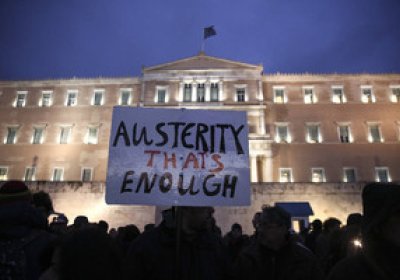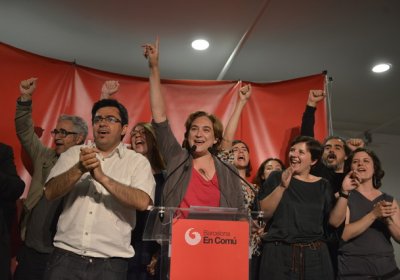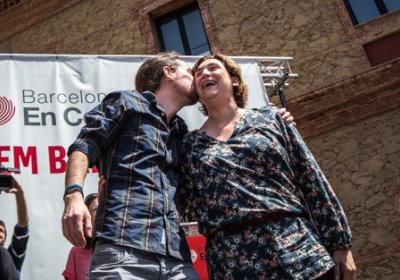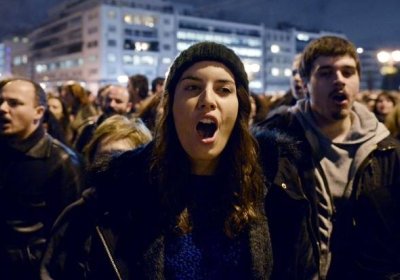For a while in late May, it looked as if negotiations over terms for releasing the last €7.2 billion owed to Greece under its second bailout package with the “Troika” of the European Union, European Central Bank and International Monetary Fund might have some chance of success.
The commentary from the SYRIZA-led Greek government's negotiators and from its creditors was of “fruitful discussions” and “meaningful progress”. Greek government spokespeople even spoke of reaching an agreement “within a week or two”, at the latest by the June 18 meeting of the eurozone finance ministers.
Dick Nichols
It was clear early on that something special was happening in the May 24 local government and regional elections across the Spanish state. In Spanish elections, the voter participation rate gets announced at 1pm and 6pm — while voting is still taking place. Well before the polling stations closed, the news was that participation was up about 5% in Catalonia and about 8% in the working-class districts of Barcelona.
Will Greece's SYRIZA-led government reach a last-minute deal with its creditors, the European Union (EU), European Central Bank (ECB) and International Monetary Fund (IMF) - the “Troika” - to release the last €7.2 billion owed to the country under Greece's second bail-out agreement?
A commentator for the mainstream Barcelona daily La Vanguardia reported on May 9 on a conversation he overheard in a lift between two “executives of a certain age”.
They were talking about an opinion poll giving the radical, movement-based ticket Barcelona Together the lead in the March 24 election for Barcelona City Council.
Executive A: “Have you seen that [incumbent Barcelona mayor Xavier] Trias is losing?”
Executive B: “Yes, [lead candidate for Barcelona Together Ada] Colau is winning.”
For three months, from November to February, the Spanish economic and political establishment was in a state of barely suppressed panic.
In national opinion polls, support for the “reds” - in the form of radical new force Podemos - had overtaken that for the establishment parties, the ruling People’s Party (PP) and the opposition Spanish Socialist Workers Party (PSOE).
In a three-hour appearance on private TV channel Star TV on April 27, Greek Prime Minister Alexis Tsipras spoke extensively about the challenges confronting the anti-austerity government led by the Coalition of the Radical Left (SYRIZA).
The program began with a grilling of Tsipras by interviewer Niko Katsinikolao and ended with questions from a 50-strong audience.
A lot of questions reflected growing concern that talks with the country’s creditors — mainly the “Troika” of the European Union (EU), European Central Bank (ECB) and International Monetary Fund (IMF) — were stalled.
A central pillar of the Spanish economic and political establishment came crashing down on Paril 16.
Rodrigo Rato, former deputy prime minister in the 1996-2004 People’s Party (PP) government of Jose Maria Aznar and head of the International Monetary Fund from 2004 to 2007, was detained on suspicion of tax evasion, concealment of assets and fraud.
The Portuguese tax-haven and tourist island of Madeira — a watering hole of Europe's super-rich — was the unlikely site of gains for the Left Bloc and the anti-corruption citizens’ movement Together for the People (JPP) in March 29 elections for the autonomous region’s legislative assembly.
The JPP, whose lead candidate Elvio Sousa promised “a different way of doing politics … favouring the most victimised and the middle class”, won five seats (10.34%) in the 47-seat legislature.
The March 22 regional elections in Andalusia, Spain’s most populous and second-poorest region, opened this year's critical election calendar.
This election cycle includes local government and 13 regional elections on May 24 and a September 27 poll in Catalonia that will double as an independence referendum. It will culminate in national Spanish elections in November.
The future course of politics in the Spanish state and Europe will greatly depend on the results of these contests.
What does the victory of radical left party SYRIZA in Greece's January 25 elections mean for politics in Europe, at Europe-wide and national levels? Both levels are closely intertwined, and since SYRIZA’s win have been having rapid feedback effects on each another.
Across Europe, the reverberations of SYRIZA’s win are being felt with rising force, both in “peripheral” Europe, but also in the German-led European Union “core”.
If anyone was still wondering whether European politics and a Europe-wide class struggle actually exist, reactions from all quarters to the first two weeks of Greece’s new SYRIZA-led government would have cleared up any doubts.
The conflict between Europe’s ruling elite and the new Greek anti-austerity administration, headed by radical left party SYRIZA, reached a high point on February 4-5.
The victory of SYRIZA — Greece’s Coalition of the Radical Left — in the January 25 elections caused enormous outpouring of joy on the streets of Athens and confirmed general expectations. The “poll of polls” done on the day before the election had SYRIZA winning 37.5% and 146 seats.
The final result was 36.49% and 149 seats. SYRIZA will now form government in alliance with the socially conservative, but anti-Brussels, Independent Greeks.
- Previous page
- Page 14
- Next page











